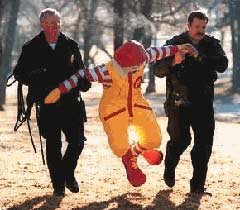Dieters Who Keep Track of What They Eat Lose Weight Twice as Fast
Dieters may be able to take solace in the fact that one of the most powerful weight-loss tools available may be as close as a pen and paper.Inn a recent study by the Kaiser Permanente Center for Health Research, participants who kept food journals lost almost double the weight of their nonjournaling counterparts.
And at a time when Americans spend $35 billion a year on weight-loss products -- a figure larger than the gross domestic product of most developing countries -- the finding could be good news for those searching for an inexpensive route to a healthier weight.
The study, published in the American Journal of Preventive Medicine, focused on the efficacy of various behavioral weight-loss interventions in more than 1,500 overweight and obese adults.
Participants were schooled on lifestyle interventions, which included weekly group sessions, regular exercise, a heart-healthy diet, reduced alcohol consumption and the use of food diaries.
fter five months, participants lost an average of almost 13 pounds -- a significant amount, according to physicians. However, those who used a food diary more than five days a week lost almost twice as much weight as those who didn't. And perhaps more impressively, they kept the weight off.
When keeping food diaries, dieters write down, for better or worse, every calorie that passes through their lips each day.
Frank Bitzer, a 64-year-old retired project manager and study subject, lost 26 pounds during the study, and his cholesterol dropped to healthy levels. Today, four years after the end of the study, he has kept off 20 pounds and continues to feel the positive health effects. Asked about his experiences with keeping a food diary, he described it as "enlightening." He attributed much of his success to the ability to gain immediate information and "see the error of your ways."It enabled me to see how much of an impact it made with even just a slight change in your diet, such as having a bowl of ice cream or a fast-food cheeseburger," he says. "That can really skew your calorie intake."
Why the Pen Is Mightier Than the Pounds
But why do the diaries work? Experts agree that the ultimate value lies in the formation of a "foundation of personal accountability." Almost everyone agrees that accountability is the most important ingredient behind any successful lifestyle change, including weight loss.Dr. Patrick O'Neil, director of the Weight Management Center at the Medical University of South Carolina, agrees. "Most of us don't really know how much we eat and drink; we have very charitable memories," he says.
In short, he explains, food diaries force an increased awareness of habits and eating patterns. By allowing patients to follow their eating patterns throughout the day, the visual diary can highlight pitfalls that may have previously gone unnoticed by a dieter.
Additionally, when clinicians such as physicians or dietitians review a diary, they can often point out problematic cues, triggers and habits that may be contributing to weight gain. The increased awareness and knowledge allows for targeted problem-solving to improve these troublesome situations. As O'Neil says, "Sometimes a little Monday-morning quarterbacking makes for a better score the next weekend."
Madelyn Fernstrom of the University of Pittsburgh Weight Management Center agrees, adding that food diaries help in "transferring that written record into a permanent mental database."
When Diaries Alone Are Not Enough
Study author Dr. Victor Stevens says that the power of food diaries lies in their flexibility, allowing them to be tailored for accountability for different goals -- from calorie counting to diet quality to overall assessment of eating habits.But when it comes to a comprehensive weight management strategy, they may not be enough. Stevens suggests that in addition to using a food diary, some dieters may benefit further from joining an organized weight-loss program that provides social commitment and accountability.
If no formal programs are available, he says, "get organized with some friends and make a commitment to help each other."







